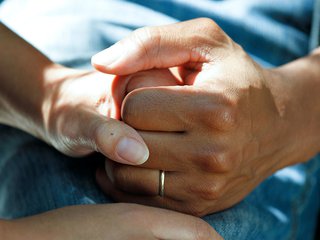Non-intensive treatment for AML
If you are not well enough to have intensive treatment, there are non-intensive treatments available.
What is non-intensive treatment for AML?
Non-intensive treatments aim to control the AML as much as possible, without causing as many side effects that could harm you more. This may be a better option for people who are older, or whose general level of fitness would make it difficult to tolerate intensive treatment.
For most people, non-intensive treatments can’t cure the AML, but they can often get the disease into remission, allowing it to be controlled it for as long as possible.
These treatments are gentler than intensive treatments, and aim to give you the best possible quality of life. Many of them can be taken at home rather than hospital.
Your treatment will be tailored to your personal situation, usually with the aim that you can spend as much time outside of the hospital as possible.
If you are having non-intensive treatment, or a loved one is, contact our Support Service. We are here for you, if you have questions or worries, or if you just need to talk:
How will treatment affect my daily life?
Most treatment can be taken at home or as an outpatient, but you’ll have regular check-ups with your hospital team. You'll also have blood tests to monitor how the treatment is working.
The treatments do have side effects, but they are not usually as severe as the ones caused by intensive treatment. Being at increased risk of infections is one side effect it's important to know about. We have more information about side effects of AML treatment.
If you're having non-intensive treatment, it might be hard for you or your family to accept that the AML probably can't be cured. Talk to your doctor though, because your outlook and prognosis can change if treatment goes well.
Talking to other people with AML can help a lot. It might also help your family to connect with other relatives of people with AML. Visit our online forum to connect with other people affected by AML.
Which drugs will I have?
There are several different drugs that can treat AML, and research continues to find new ones.
Some people can have their treatment as part of a clinical trial, which can allow you to have one of the latest treatments.
Not everyone's AML is the same. Your doctor will recommend the drugs that are most likely to work for you, which depends on the type of AML you have. They will tell you if there are any suitable clinical trials available too, and you can always ask.
Below we list some of the most commonly used non-intensive treatments for AML, including newer drugs being looked at in clinical trials. Many of these can be used for as long as they are helping you.
Ivosidenib is a targeted therapy drug. It works by affecting a protein called IDH1 inside AML cells. Ivosidenib is a tablet that you take once a day.
Azacitidine is a chemotherapy drug that is given by injection.
Venetoclax is a targeted therapy drug. It affects a protein called BCL2 inside AML cells, which makes the AML cells more sensitive to chemotherapy. Venetoclax is a tablet.
Azacitidine is a chemotherapy drug that is given by injection.
Venetoclax is a targeted therapy drug. It affects a protein called BCL2 inside AML cells, which makes the AML cells more sensitive to chemotherapy. Venetoclax is a tablet.
Low-dose cytarabine is a form of chemotherapy that is given by injection.
Azacitidine is a chemotherapy drug that is given to you by injection just under the skin (subcutaneous injection), usually in your tummy, arm or thigh. The injections are usually given daily for 5 or 7 days and this is repeated every 4 to 6 weeks.
Low-dose cytarabine is a chemotherapy drug that is given to you by injection just under the skin (subcutaneous injection), usually in your tummy, arm or thigh. Sometimes it is given as an intravenous infusion.
The injections are usually given once a day for 10 days and this is repeated every 4 to 6 weeks. It is sometimes possible to have LDAC injections given at home, either by a district nurse or by yourself or a family member.
Hydroxycarbamide is a low-dose chemotherapy drug that you take by mouth as capsules. It can help control your white blood cell count if you have advanced AML.
Research and clinical trials
There might be a clinical trial or study you could join, looking at new ways of giving treatment. This can also help improve treatment for future AML patients. Ask your team if there are any clinical trials available to you. Or contact our Clinical Trials Support Service for more information.
Supportive care
Some people choose not to go ahead with any active chemotherapy or targeted therapy treatment. For others, their overall health means they can’t have active treatment, as it carries too many risks.
However, this doesn’t mean that you can’t have any treatment at all. You would still be given any other treatments you need to help your body cope with the AML and to keep you comfortable, like antibiotics or blood transfusions (see below).
Some people also take a low-dose chemotherapy tablet called hydroxycarbamide to manage their white blood cell count if it’s high.
What other treatments might I need?
As well as the treatment you have for the leukaemia, you'll need other treatments to help your body cope with side effects.
You’ll probably need antibiotics to reduce your risk of getting an infection during treatment. Although antibiotics do reduce the risk of getting an infection, it’s still quite likely that you'll get an infection at some time during your treatment, and this can be serious. If this happens, you’ll be given other types of antibiotics, usually directly into your vein.
You will probably also need to have transfusions of red blood cells and platelets. These are taken from healthy blood donors and used to replace the cells that your body cannot make.

If someone you know has blood cancer
If you're close to someone who's been diagnosed with blood cancer, you may find it helpful to read our information for family, friends and carers.
If you're told the AML can't be cured
Being told that your treatment, or the treatment of someone you love, is not likely to cure the AML, is understandably extremely difficult.
You might feel very shocked, frightened, or very sad. You might have feelings similar to grief, or total helplessness. However you are feeling is valid at this very difficult time.
Many people say they can only focus on one day at a time, and that treasuring happy memories and being there for each other is all you can do.
If you're in this situation, we are here for you, for emotional support or to talk about how you're coping. Contact our Support Service on 0808 2080 888.
Nothing left unsaid
In this real life story, Sue talks about dealing with the news that her husband's blood cancer probably wouldn't be cured.

